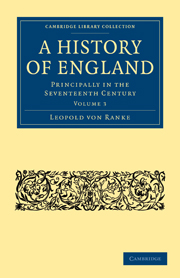Book contents
- Frontmatter
- Contents
- BOOK XI THE COMMONWEALTH IN ENGLAND, 1649—1653
- BOOK XII THE PROTECTORATE OF OLIVER CROMWELL, 1653–1658
- BOOK XIII FALL OF THE PROTECTORATE AND THE COMMONWEALTH. RESTORATION OF THE MONARCHY, 1658—1660
- BOOK XIV THE FIRST FIVE YEARS UNDER CHARLES II. THE RESTORATION OF THE ANGLICAN CHURCH
- CHAP. I The state of affairs at the Restoration
- CHAP. II The Convention Parliament in the summer of 1660
- CHAP. III Foreign policy. Marriages in the Royal Family
- CHAP. IV Religious differences. The Coronation. A new Parliament
- CHAP. V The first two years of the Long Parliament of the Restoration. The Act of Uniformity
- CHAP. VI Relations with France. Sale of Dunkirk
- CHAP. VII A scheme for reunion with Rome. Claim to the dispensing power. Personal relations in Court and State
- BOOK XV THE DUTCH WARS OF CHARLES II. ESTABLISHMENT OF THE PROTESTANT AND PARLIAMENTARY CHARACTER OF THE CONSTITUTION 1664—1674
CHAP. II - The Convention Parliament in the summer of 1660
Published online by Cambridge University Press: 07 June 2011
- Frontmatter
- Contents
- BOOK XI THE COMMONWEALTH IN ENGLAND, 1649—1653
- BOOK XII THE PROTECTORATE OF OLIVER CROMWELL, 1653–1658
- BOOK XIII FALL OF THE PROTECTORATE AND THE COMMONWEALTH. RESTORATION OF THE MONARCHY, 1658—1660
- BOOK XIV THE FIRST FIVE YEARS UNDER CHARLES II. THE RESTORATION OF THE ANGLICAN CHURCH
- CHAP. I The state of affairs at the Restoration
- CHAP. II The Convention Parliament in the summer of 1660
- CHAP. III Foreign policy. Marriages in the Royal Family
- CHAP. IV Religious differences. The Coronation. A new Parliament
- CHAP. V The first two years of the Long Parliament of the Restoration. The Act of Uniformity
- CHAP. VI Relations with France. Sale of Dunkirk
- CHAP. VII A scheme for reunion with Rome. Claim to the dispensing power. Personal relations in Court and State
- BOOK XV THE DUTCH WARS OF CHARLES II. ESTABLISHMENT OF THE PROTESTANT AND PARLIAMENTARY CHARACTER OF THE CONSTITUTION 1664—1674
Summary
It had originally been intended that the Parliament chosen at the last elections should do nothing more flian formally acknowledge the King; this done, the King was at once to issue writs for a fresh election, as only a Parliament summoned by the King himself could be considered a lawful one.
But it was now urged that a fresh election if held at once would arouse all the evil passions in the country, and would endanger the conciliatory position assumed by the government. One of the first acts of the newly-restored King was to recognise as lawful that Lower House which had been elected without his writs, though it was true that such a measure did not completely satisfy the legal conscience of the nation. The power of dissolution alone he expressly reserved to himself.
More than this was impracticable; inasmuch as the Lower House, without waiting for the King's return, had, in obedience to his proclamation, proceeded at once to settle the points touched upon in the manifesto issued from Breda, and which had been first mooted in London. A proclamation, dated the 8th of May, states that the Commons assembled in Parliament were busied with certain measures of the greatest importance for the country—an act namely for the security of the Protestant religion, an act of amnesty, and lastly, one for the payment of the arrears due to the army and navy.
- Type
- Chapter
- Information
- A History of EnglandPrincipally in the Seventeenth Century, pp. 322 - 334Publisher: Cambridge University PressPrint publication year: 2010First published in: 1875

